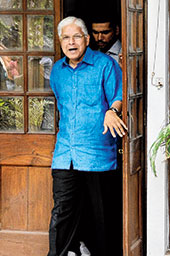 |
 |
| Kumar comes out of his Delhi home to address a news conference, Bansal at his residence on Saturday. Pictures by Ramakant Kushwaha and PTI |
May 11: The removal of two Union ministers has again demonstrated the Congress’s attempts to convert crisis into some sort of advantage.
The late V.N. Gadgil, who had served as Union minister and spokesperson for various Congress regimes, had once summed it up, saying the party knew how to “cool things down”.
“We are a natural party of governance. Sarkar chalana aata hai; our motto is ‘thanda karke khao’ (we know how to run the country. We know how to cool things down and relish),” Gadgil had said.
The resignation of railway minister Pawan Kumar Bansal was never in doubt but the Congress waited inordinately.
As the days passed, the Karnataka verdict offered the party a morale booster but the day coincided with the Supreme Court’s strictures against the Centre’s handling of the coal allocation probe.
Still, neither party chief Sonia Gandhi nor Manmohan Singh acted. Gossips, rumours and half-truths began to circulate.
Were the two not on the same page? Was the Prime Minister extracting a price of sorts in exchange for running a messy coalition?
This is not the first time that the Congress has forced or secured the resignations of ministers who had failed to pass the leadership’s “perception” test.
Shashi Tharoor, a junior foreign minister in April 2010, had to sit out after a shareholding pattern in an IPL franchisee reportedly brought disrepute to the party.
Until December 6, 2005, Natwar Singh had a formidable presence in Singh’s cabinet.
He seldom missed the opportunity to remind the Prime Minister how close he was to Indira Gandhi, Rajiv Gandhi and Sonia.
Then his name got caught up in the oil-for-food scam. The Paul Volcker committee — set up by the UN to inquire into the controversy — named Natwar, his son Jagat and some other Indian companies as beneficiaries of the scam.
For the first few days, Natwar remained a picture of confidence till Sonia discovered that the name of India’s grand old party had indeed been misused.
Natwar tried meeting her but the doors of 10 Janpath were firmly shut. He cried foul, got expelled and tried his luck in the Samajwadi Party and the Bahujan Samaj Party. The career diplomat is still struggling to find his feet in Indian politics again.
Over the years, several others had failed the leadership’s “perception” test.
After the 26/11 attacks in Mumbai, the then Maharashtra chief minister, Vilasrao Deshmukh, had initially seen nothing wrong in taking film director Ram Gopal Varma to the ravaged Taj hotel.
He kept giving sound bites till AICC observers landed in Mumbai to elect a new leader of the Congress legislative party.
The late Arjun Singh, too, had shown reluctance to step down in February 1988 in the wake of the Churhat lottery scandal.
Arjun had dithered till the then Union home minister, Buta Singh, arrived, allegedly armed with some files and dossiers.
From 1988 to 1991, Arjun languished on the sidelines.










